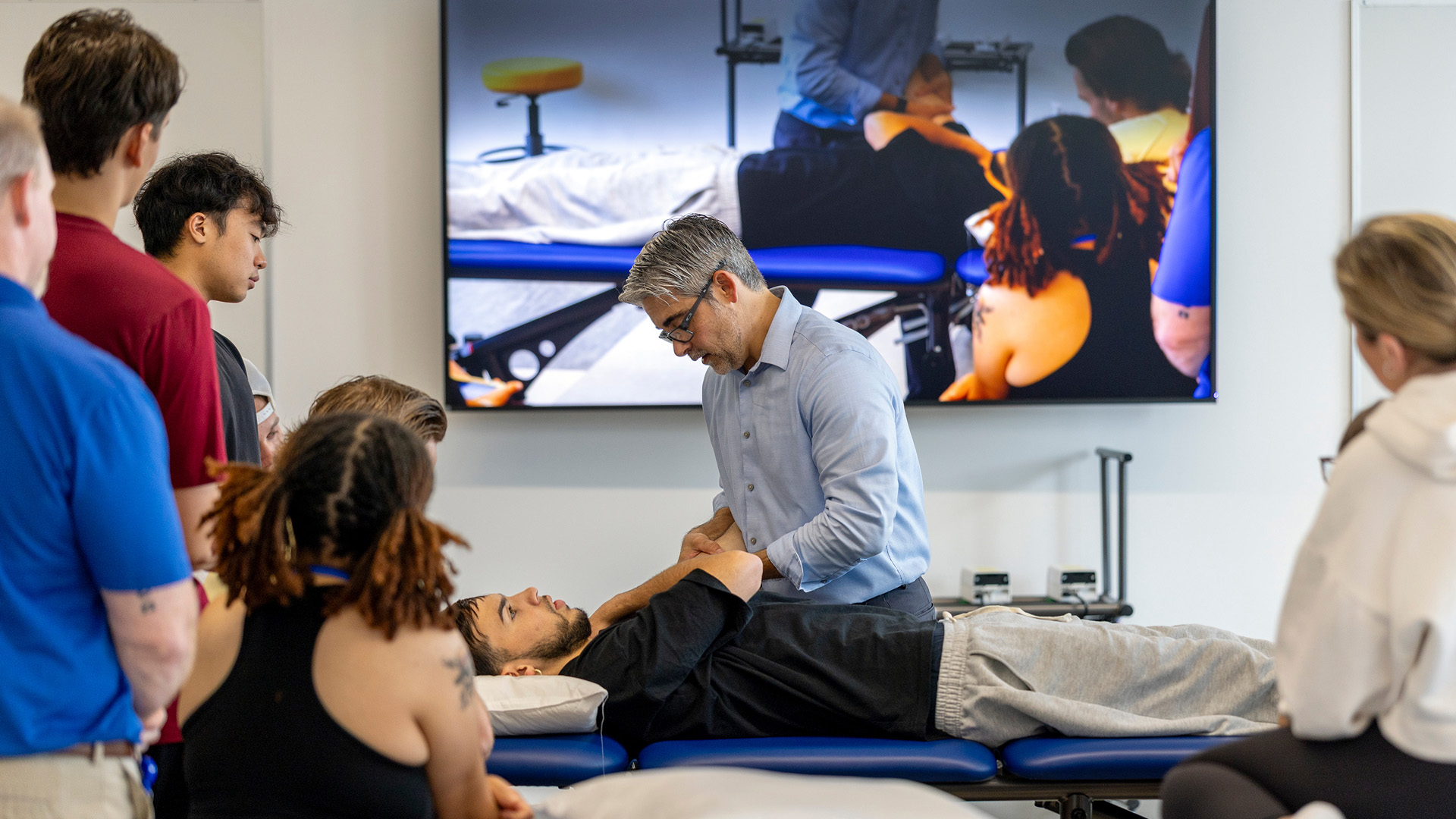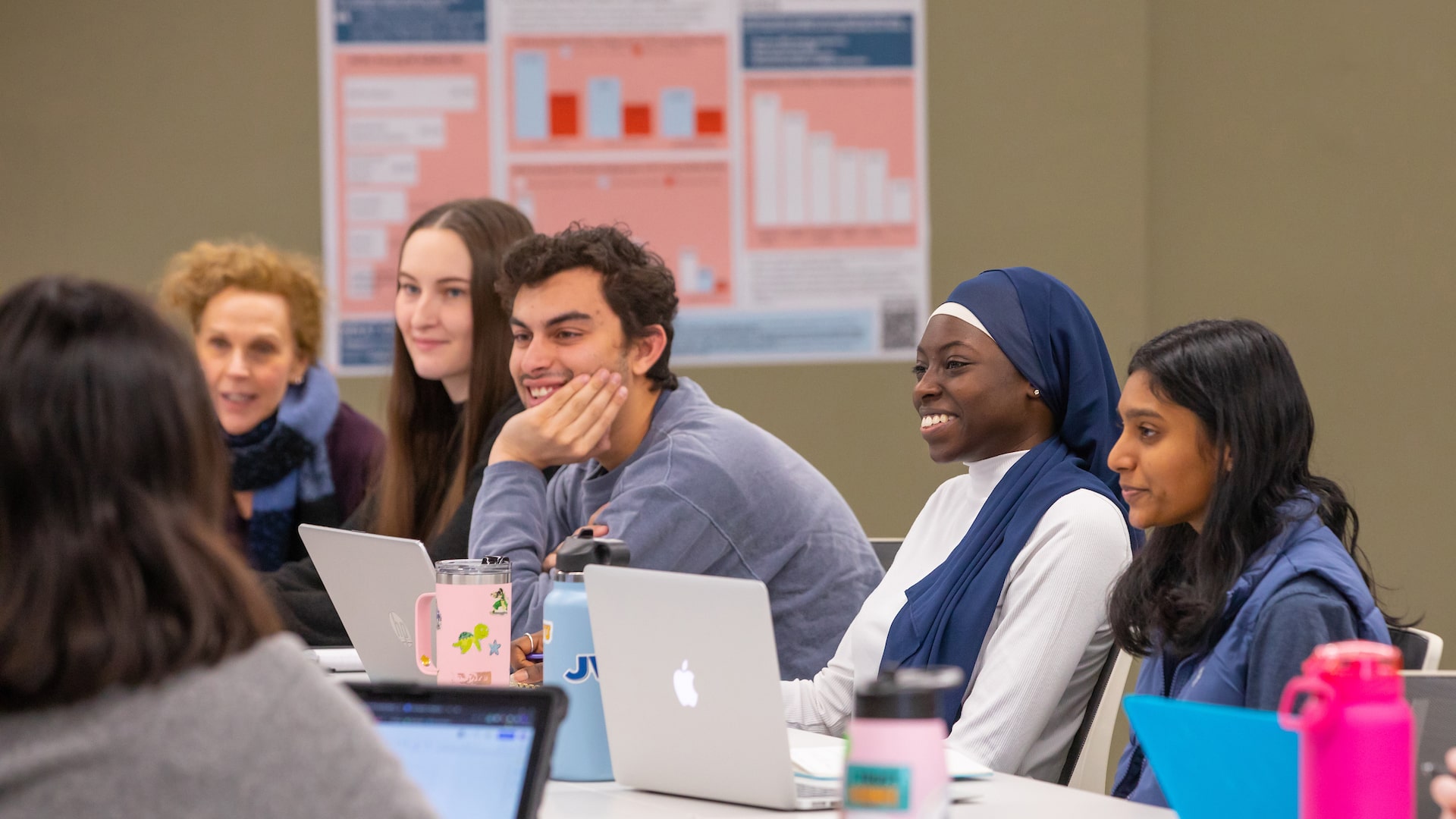10 Health & Wellness Students Published in Rhode Island Medical Journal
Ten JWU students — some still undergrads, others newly minted alumni — recently saw their names in print, not in a school paper or class project, but in the Rhode Island Medical Journal. The June 2025 issue features a special section of research around the topic of young adult mental health, a growing public health issue, which debuted six original research studies by students and faculty. It’s not every day that undergraduate students co-author published studies — let alone in a professional journal — but for these students, it was the culmination of deep, collaborative work guided by faculty mentors who treated them not just as learners, but as fellow researchers.
“It’s important for undergraduates, especially at a university like JWU, to have opportunities to participate in publishable research because it reinforces the university’s commitment to experiential learning, academic excellence and career readiness,” said Samantha Rosenthal, Ph.D., MPH, professor of public health and director of the Center for Student Research & Interdisciplinary Collaboration (CSRIC).
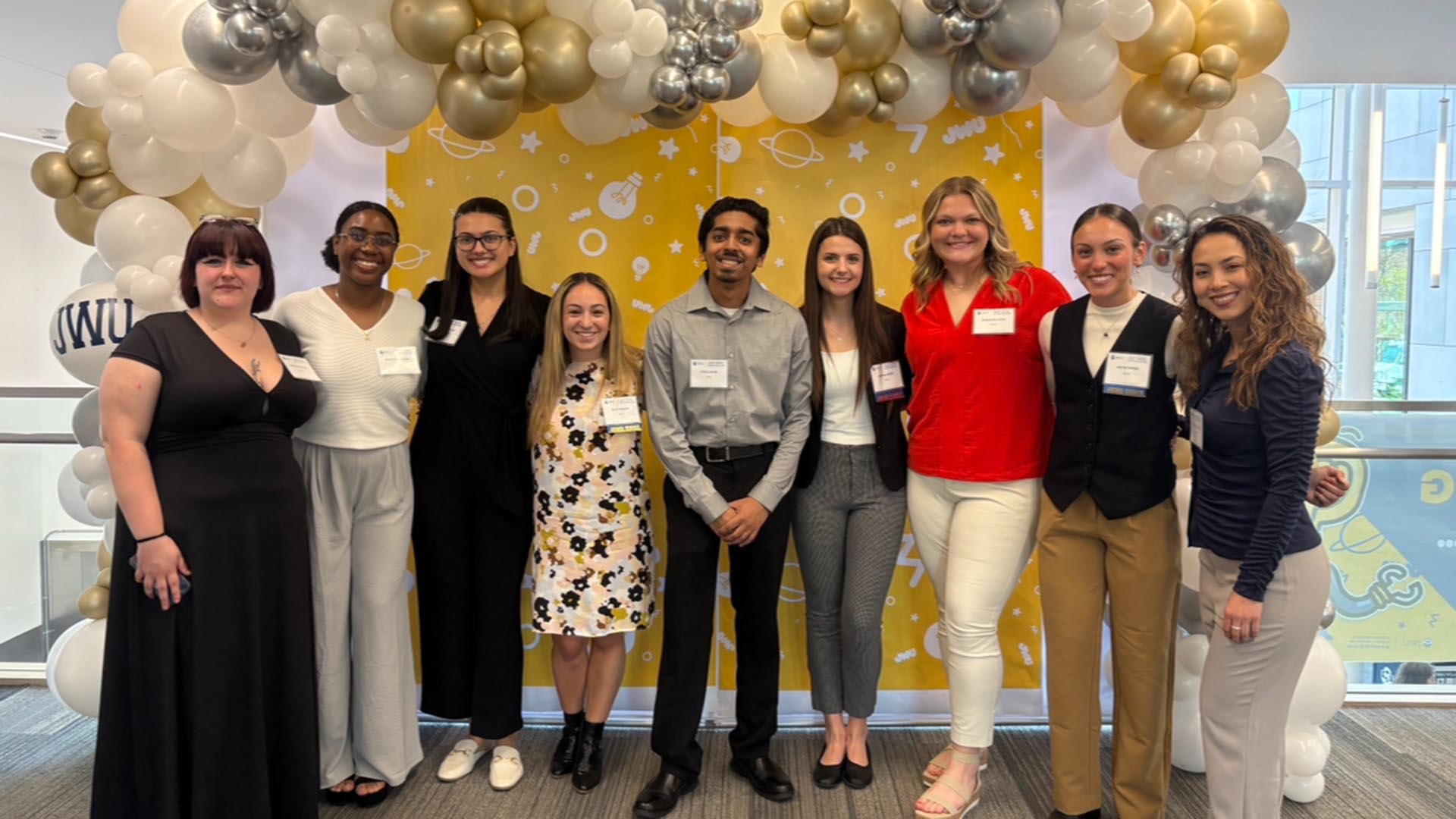
From left to right: Haylee Canadas, Cierra Bradford, Madison Morais, Lilly Oliveira, Steve Jacob, Abigail Nosal, Madalyn Lyons, Jadyn Torres and Andrea Avila.
Dr. Rosenthal served as a faculty mentor, working alongside Professor and Public Health Program Director Jonathan Noel, Ph.D., MPH and Post-Doctoral Teaching & Research Fellow Kelsey Gately, OTD, OTR/L. According to Dr. Rosenthal, giving students a chance to engage in rigorous, faculty-guided research helps them develop essential skills — like critical thinking, evidence-based decision making and professional writing — that will carry them forward no matter their chosen path.
CSRIC faculty and students conducted the research in partnership with Rhode Island Department of Behavioral Healthcare, Developmental Disabilities & Hospitals (BHDDH). The research leveraged data collected from the 2024 Rhode Island Young Adult Survey (administered by BHDDH), but the focus areas resulted from careful study and analysis by faculty and students. The group narrowed their focus to looking at how restrictive masculinity norms — typically rigid and inflexible expectations of what it means to be a “real” man — affect young adults across gender identities.
“I got involved in this research project because I wanted to explore how traditional expectations around masculinity can lead to mental health issues, especially for people across different sexual and gender identities,” said health science major Abigail Nosal ’26. “Working with professors who are not only experts in their field but also genuinely supportive of student research made a significant impact on my academic growth. Their guidance throughout this experience was incredibly valuable. They helped me navigate the research process, refine my ideas and approach this project in new ways.”
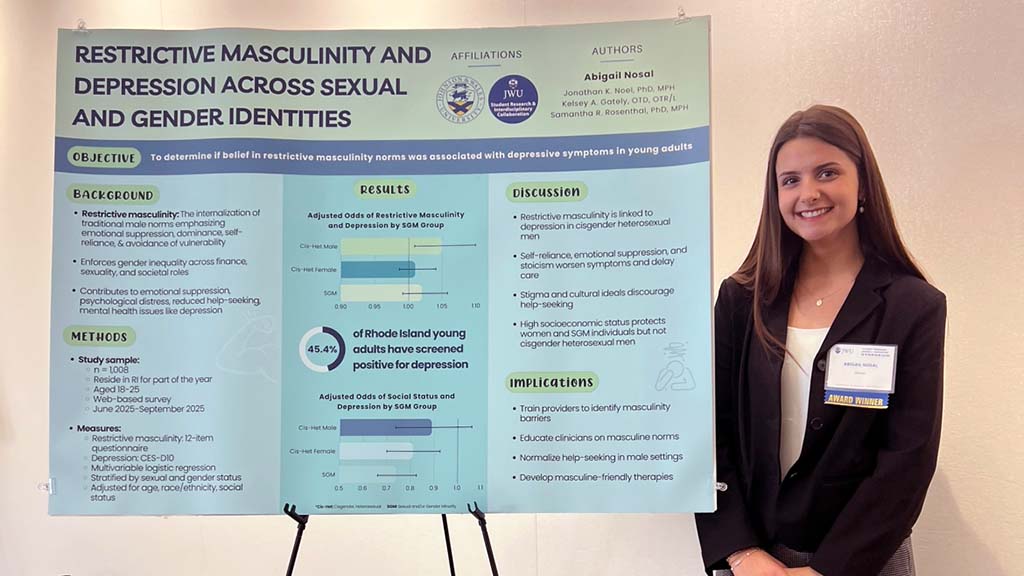
Abigail Nosal with her poster presentation at the 2025 Student Research, Design & Innovation Symposium.
For many of the students involved, the experience provided a unique opportunity to refine their academic skills while working on real-world public health challenges. “I love being able to make an impact in public health so being involved in this research project was very beneficial for me,” shared Cierra Bradford ’26, a healthcare administration major. “This experience has shaped my career goals by showing me the importance of research and policy development, which I now hope to further my education in graduate school.”
That sentiment was echoed by Sheriyah “Cora” Hicks ’27, who’s also studying healthcare administration: “This experience has solidified what direction I want to take my life; I plan to do my master's in public health and have landed an internship that is public facing, giving me more opportunities to gain experience that is important for research.”
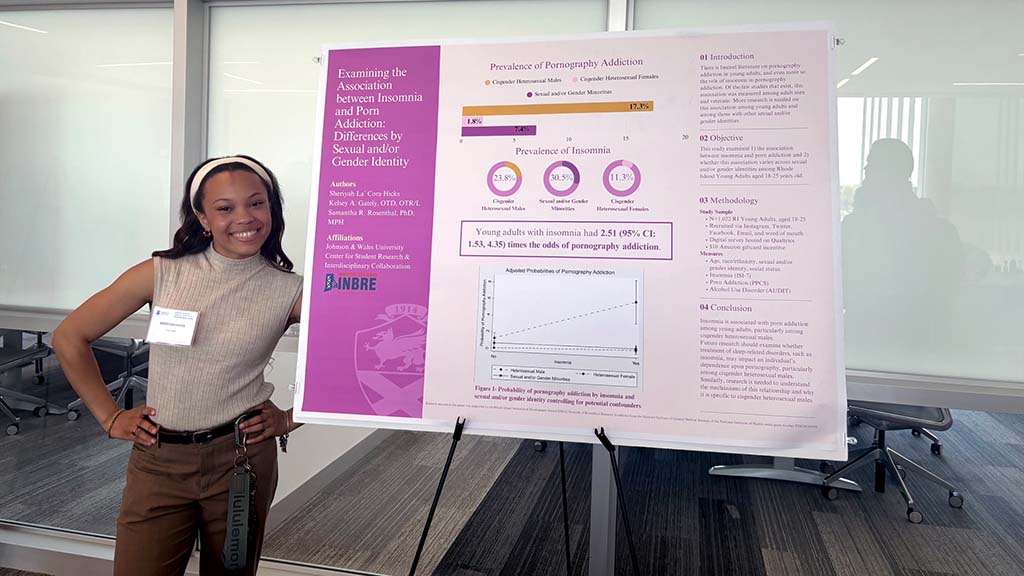
Sheriyah “Cora” Hicks with her poster presentation at the 2025 Student Research, Design & Innovation Symposium.
For many, the highlight of the experience was learning the process of publishing, from forming questions to analyzing data and synthesizing findings into results. “Participating in CSRIC helped me grow my research skills beyond the classroom. Instead of class assignments, I was working on high-quality research eligible for scientific publication. This experience taught me a lot about how to think like a researcher and expand my critical thinking skills along with my writing skills,” shared public health major Lilly Oliveira ’25. “This experience complemented my coursework, where I had been writing multiple research papers, and helped me bridge the gap between academic learning and real-world application.”
“Working on a peer-reviewed paper is a tremendous opportunity, especially as an undergraduate,” said Steve Jacob ’26, a health science major with a chemistry minor. “This experience was challenging, but also incredibly rewarding. I learned to evaluate findings, present them logically and use critical feedback to improve my work. In the end, it made me realize that I wasn’t just learning science but actively contributing to it as well.”
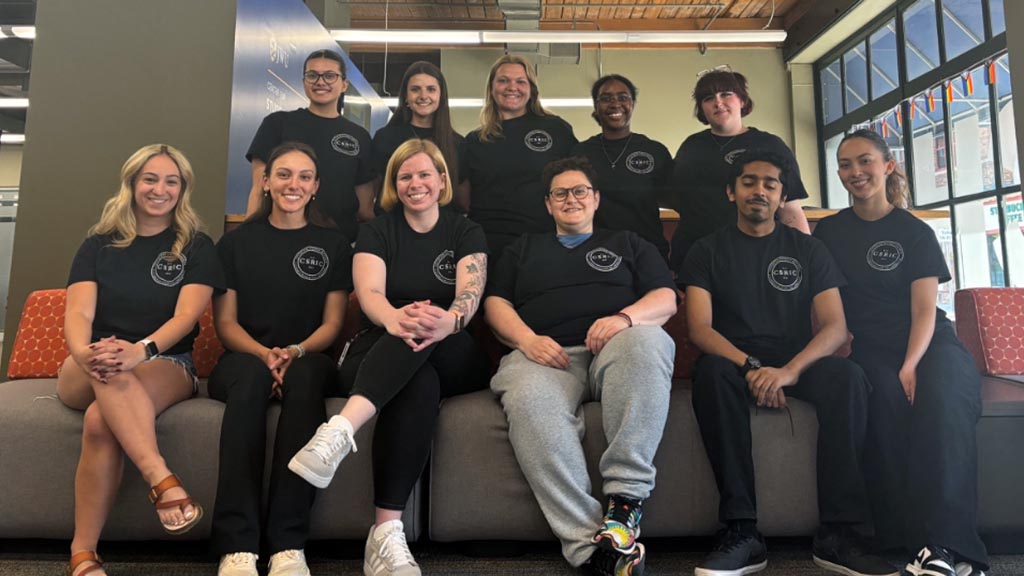
From left to right, top row: Madison Morais, Abigail Nosal, Madalyn Lyons, Cierra Bradford and Haylee Canadas. Bottom row: Lilly Oliveira, Jadyn Torres, Kelsey Gately, Samantha Rosenthal, Steve Jacob and Andrea Avila.
Dr. Rosenthal praised the students for their intellectual curiosity, maturity and commitment to tackling complex, interdisciplinary topics with both academic rigor and creativity. “Their professionalism in navigating the research process, from formulating original questions to analyzing data and presenting their findings, showed not only strong foundational skills but also a genuine passion for discovery. Their willingness to collaborate, receive feedback and refine their work reflected a growth mindset that’s essential in any serious research environment,” added Dr. Rosenthal.
These research projects not only tackled a timely and important public health issue — it also gave students the opportunity to collaborate, contribute new knowledge and develop the research and communication skills that will set them apart in graduate school and beyond. This kind of experiential learning underscores JWU’s commitment to preparing students for real-world careers in health, science and beyond.
Students and alumni who co-authored articles:
- Andrea Avila ’25, Health Science
- Cierra Bradford ’26, Healthcare Administration
- Haylee Canadas ’25, ’28 OTD, Health Science
- Sheriyah "Cora" Hicks ’27, Healthcare Administration
- Steve Jacob ’26, Health Science
- Madalyn Lyons ’26, Exercise & Sports Science
- Madison Morais ’25, Health Science
- Abigail Nosal ’26, Health Science
- Lilly Oliviera ’25, Public Health
- Jadyn Torres ’26, Biology
Research Topics Explored in Rhode Island Medical Journal:
-
- "Associations between Restrictive Masculinity and Depression across Sexual and Gender Identities" with authors Jonathan K. Noel, Abigail G. Nosal, Kelsey A. Gately, Samantha R. Rosenthal.
- "Insomnia and Pornography Addiction in Rhode Island Young Adults" with authors Jonathan K. Noel, Steve Jacob, Sheriyah L. Hicks, Kelsey A. Gately, Samantha R. Rosenthal.
- “Restrictive Masculinity Norms and Past-Year Checkup among Young Adult Males and Females” with authors Samantha R. Rosenthal, Madison A. Morais, Kelsey A. Gately.
- “Brain Injury & Problem Gambling among Rhode Island Young Adults” with authors Jonathan K. Noel, Kelsey A. Gately, Cierra B. Bradford, Haylee A. Canadas, Samantha R. Rosenthal.
- “Restrictive Masculinity Norms and Eating Disorder Risk in Young Adult Females” with authors Samantha R. Rosenthal, Jadyn N. Torres, Madalyn E. Lyons, Kelsey A. Gately.
- “The Behavioral Health Harms of Youth Exposure to Gun Violence: A Rhode Island Example” with authors Samantha R. Rosenthal, Lilly A. Oliviera, Andrea Y. Avila, Kelsey A. Gately, Jonathan Barkley*, Jolayemi Ahamiojie*, Jonathan K. Noel.
* Collaborators from the Rhode Island Department of Health.

